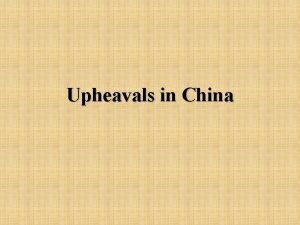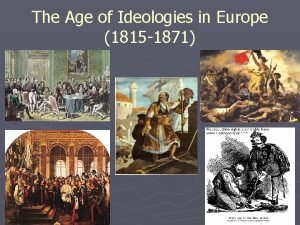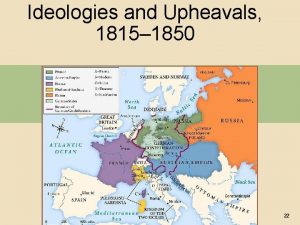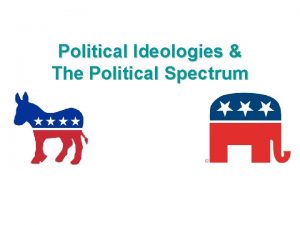Ideologies and Upheavals of the th 19 century



















- Slides: 19

Ideologies and Upheavals of the th 19 century


Europe in 1812

The Congress of Vienna (September 1, 1814 – June 9, 1815)

Key Players at Vienna Foreign Minister, Viscount Castlereagh (Br. ) Tsar Alexander I (Rus. ) The “Host” Prince Klemens von Metternich (Aus. ) King Frederick William III (Prus. ) Foreign Minister, Charles Maurice de Tallyrand (Fr. )

Main Objectives e It’s job was to undo everything that Napoleon had done: V Reduce France to its old boundaries her frontiers were pushed back to 1792 level. V Restore as many of the old monarchies as possible that had lost their thrones during the Napoleonic era.

Key Principles Established at Vienna V Balance of Power V Legitimacy V Compensation e Coalition forces would occupy France for 3 -5 years. e France would have to pay an indemnity of 700, 000 francs.

Changes Made at Vienna (1) V France was deprived of all territory conquered by Napoleon. V Russia was given part of Duchy of Warsaw (Poland). V Prussia was given half of Saxony, parts of Poland, and other German territories. V A Germanic Confederation of 30+ states (including Prussia) was created from the previous 300, under Austrian rule. V Austria was given back territory it had lost recently, plus more in Italy. V The House of Orange was given the Dutch Republic and the Austrian Netherlands to rule.

The Germanic Confederation, 1815

Changes Made at Vienna (2) V V V V Norway and Sweden were joined. The neutrality of Switzerland was guaranteed. Hanover was enlarged, and made a kingdom. Britain was given Cape Colony, South Africa, and various other colonies in Africa and Asia. The Bourbon Ferdinand I was restored in the Two Sicilies. The slave trade was condemned (at British urging). Freedom of navigation was guaranteed for many rivers. No reparations from France

Europe After the Congress of Vienna

What was the legacy of the Congress of Vienna?

Liberalism (Classical Liberalism) • • • Equality Challenged conservatism across Europe Representative gov’t Freedom of speech, press, assembly England- Parliament; France- Constitutional Charter

Liberalism • Laissez Faire economy- gov’t stays out of the economy • Adam Smith- Wealth of Nations- “invisible hand” of the market that is self regulated (merged with Locke’s theory of civil society) • Embraced by English businessmen- outlawed unions- seen as bad for competition • Property qualifications for voting

Adam Smith Wealth of Nations 1776

• • The Legacy of Klemens von Metternich POV- Conservative Aristocratic family and ambitions Foreign minister for 39 years Regarded the nobility as a human institution not to be trifled with • Believed the liberalism that led to the American & French revolutions created violence and upheaval • Honestly believed peasants wanted to be peasants • Liberalism’s main threat was nationalism

Nationalism • National identity • Based on common language, history and territory • Can be changed to suit the needs of a country • Very liberal or radical • Stressed differences among people- friction and superiority among people

Socialism French • Government intervention • No laissez faire • Individualism was selfish • Count Henri de Saint-Simon- social organization Marxist • Middle class (bourgeoisie) vs. working class (proletariat)

Why is this important? *We begin to see the emergence of nationalism *We begin to see the developments of new social doctrines (socialism, etc. ) *Will lead to the development of modern notion of liberals and conservatives
 Upheavals in china
Upheavals in china Political ideology definition ap gov
Political ideology definition ap gov Democratic socialism
Democratic socialism Ideology examples
Ideology examples Social 30-2 textbook
Social 30-2 textbook Two dimensions of political ideologies
Two dimensions of political ideologies Obsolescent frontier civilization
Obsolescent frontier civilization Curriculum ideologies
Curriculum ideologies An age of ideologies
An age of ideologies Elizabethan ideologies
Elizabethan ideologies Political ideologies cows
Political ideologies cows Elements of marxism
Elements of marxism Chechynia
Chechynia An age of ideologies
An age of ideologies Hình ảnh bộ gõ cơ thể búng tay
Hình ảnh bộ gõ cơ thể búng tay Lp html
Lp html Bổ thể
Bổ thể Tỉ lệ cơ thể trẻ em
Tỉ lệ cơ thể trẻ em Gấu đi như thế nào
Gấu đi như thế nào Tư thế worm breton là gì
Tư thế worm breton là gì




































